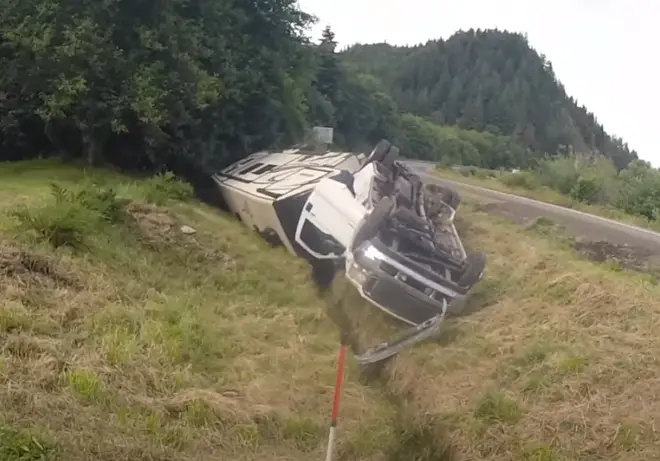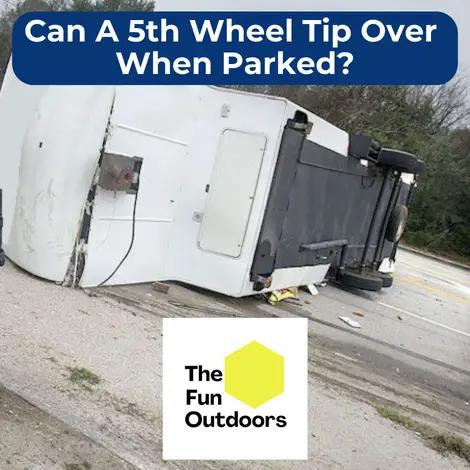Can a 5th wheel tip over when parked? This is a common question among 5th wheel owners, especially those who are new to the world of RVing. The answer is yes, a 5th wheel can tip over when parked, but it is not very common.
Factors such as uneven ground, strong winds, and improper leveling can increase the risk of a 5th wheel tipping over when parked. However, there are precautions that you can take to prevent this from happening. In this article, we will explore the factors that can influence a 5th wheel tipping over, as well as the precautions you can take to prevent it from happening.
Key Takeaways
- A 5th wheel can tip over when parked, but it is not very common.
- Factors such as uneven ground, strong winds, and improper leveling can increase the risk of a 5th wheel tipping over when parked.
- Precautions such as proper leveling, chocking the wheels, and using stabilizer jacks can help prevent a 5th wheel from tipping over.
Can A 5th Wheel Tip Over When Parked?

You may be wondering if your 5th wheel can tip over when parked. The short answer is yes, it can, but it would take very high winds to do so.
So although a 5th wheel tip over is unlikely, it’s still important to take steps to minimize the effect of the wind to ensure your safety and the safety of your RV.
One of the key factors in preventing your 5th wheel from tipping over is understanding the concept of gravity and the center of gravity.\
The center of gravity is the point where the weight of the RV is evenly distributed.
If the weight distribution is uneven, it can cause stability issues and increase the risk of tipping over.
When parking your 5th wheel, make sure it is level and the weight is evenly distributed.
Retract awnings and bring in slide-outs to reduce wind resistance.
Also, be mindful of your position and stay attached to your tow vehicle to add an extra layer of stability.
It’s important to note that the size and weight distribution of your 5th wheel can also impact its stability.
A larger and heavier RV will require more attention to ensure it is properly stabilized when parked.
Factors Influencing a 5th Wheel Tipping Over

When it comes to parking a 5th wheel, there are several factors that can influence whether or not it will tip over. Here are some of the most important factors to keep in mind:
Wind Conditions
One of the biggest factors that can cause a 5th wheel to tip over is wind. High winds, wind gusts, and strong gales can all cause a 5th wheel to sway and potentially tip over.
Wind direction can also play a role, as crosswinds can be particularly dangerous.
Be sure to check the weather forecast and avoid parking your 5th wheel in areas with high wind speeds.
Parking Angle and Level
The angle and level of your parking spot can also affect the stability of your 5th wheel.
If your spot is too steep or uneven, it can cause your 5th wheel to tilt and potentially tip over.
Use stabilizers and leveling blocks to ensure that your 5th wheel is parked on a stable, level surface.
See Related: How to fix RV Wheels Off Ground After Leveling & How Many Wheel Chocks Do I Need?
Size and Weight of the RV
The size and weight of your 5th wheel can also affect its stability. Generally, larger and heavier 5th wheels are more stable than smaller, lighter ones.
However, even large 5th wheels can tip over if they are not parked properly or if wind conditions are unfavorable.
Presence of Slide-Outs
Many 5th wheels come equipped with slide-outs, which can increase the risk of tipping over.
When slide-outs are extended, they can shift the center of gravity and make the 5th wheel less stable.
Be sure to retract your slide-outs before driving or parking your 5th wheel.
See Related: 5th Wheel vs Gooseneck: What’s The Difference?
Precautions to Prevent 5th Wheel Tipping
When it comes to preventing your 5th wheel from tipping over, there are several precautions that you can take.
In this section, we will go over some of the most important steps that you can take to ensure your 5th wheel stays upright and safe.
Proper Parking (Point Into The Wind)
One of the most important things you can do to prevent your 5th wheel from tipping over is to park it properly.
Always park your 5th wheel with the front pointed into the wind. This will help to reduce the impact of any gusts of wind that may come along.
Use The Stabilizing Jacks
Using stabilizing jacks is another important step you can take to prevent 5th wheel tipping.
Stabilizing jacks help to keep your 5th wheel level and stable, reducing the risk of it tipping over.
Make sure to use the leveling jacks on both sides of the 5th wheel to ensure it is properly stabilized.
Retract Your RV Patio Awnings
Retracting your RV patio awnings is another important step you can take to prevent 5th wheel tipping.
Awnings can catch the wind, causing your 5th wheel to become unstable. By retracting your awnings, you can reduce the risk of your 5th wheel tipping over.
See Related: How to Manually Retract an RV Awning
Keep Your RV Hitched To The Tow Vehicle
Keeping your 5th wheel hitched up to the tow vehicle is another important safety precaution.
When your 5th wheel is hitched up, it is less likely to tip over. Make sure to double-check that your hitch is properly secured before hitting the road.
Securing the RV in High Winds
In high winds, it is important to take extra precautions to ensure that your 5th wheel stays safe and secure.
Here are some additional steps you can take:
- Use tie-downs to secure your 5th wheel to the ground.
- Use wheel chocks to prevent your 5th wheel from rolling.
- Avoid parking your 5th wheel in areas that are prone to high winds.
Retract Your Slide-Outs If Possible
If you have slide-outs on your 5th wheel, it is a good idea to retract them when you are parked.
Slide-outs can make your 5th wheel top-heavy, increasing the risk of it tipping over.
See Related: How To Reset an RV Slide Out and our guide to RV Slide Out Maintenance
Release Your RV Air Bags (If Applicable)
If your 5th wheel is equipped with air bags, make sure to release them when you are parked. This will help to reduce the risk of your 5th wheel tipping over.
By following these precautions, you can help to ensure that your 5th wheel stays safe and stable, even in high winds or other challenging conditions.
Potential Damages from 5th Wheel Tipping

If your 5th wheel tips over when parked, it can cause significant damage to your vehicle and surrounding property. Here are some potential damages that you should be aware of:
- Damage to the 5th wheel: When a 5th wheel tips over, it can cause damage to the exterior, interior, and mechanical components of the vehicle. The frame, axles, and wheels can also be damaged in the process.
- Damage to trees: If you park your 5th wheel near trees, there is a risk that the vehicle could fall onto them. This can cause damage to the trees, as well as any structures or objects that are nearby.
- Falling tree limbs: In addition to the risk of the 5th wheel falling onto trees, there is also a risk of falling tree limbs. If a tree limb falls onto your 5th wheel, it can cause significant damage to the roof, windows, and exterior of the vehicle.
- Harm to people: If someone is inside the 5th wheel when it tips over, they can be seriously injured or killed. Additionally, if the 5th wheel falls onto someone or something, it can cause harm or damage.
It is important to take steps to prevent your 5th wheel from tipping over when parked.
This includes properly leveling the vehicle, using stabilizers, and avoiding parking on uneven or soft ground.
By taking these precautions, you can reduce the risk of damage and harm caused by a 5th wheel tipping over.
Driving a 5th Wheel in Various Conditions
When you own a 5th wheel, it’s important to know how to drive it in various conditions to ensure your safety and the safety of others on the road.
Here are some tips to help you drive your 5th wheel in different situations:
Towing a 5th Wheel in High Winds
Driving a 5th wheel in high winds can be challenging and dangerous. The wind can cause your trailer to sway, which can lead to a rollover.
If you’re driving in high winds, it’s important to slow down and maintain a safe speed. Be sure to keep both hands on the wheel and be prepared to make quick adjustments if needed.
To reduce the risk of trailer sway, you can use a sway bar or weight distribution hitch to reduce trailer tongue weight.
These devices help distribute weight evenly across your trailer and tow vehicle, which can improve stability and reduce sway.
Highway Driving with a Fifth Wheel
When driving on the highway with your 5th wheel, it’s important to follow the posted speed limits and maintain a safe distance from other vehicles.
Keep in mind that your 5th wheel is larger and heavier than most vehicles on the road, so it may take longer to stop or change lanes.
To avoid trailer sway while driving on the highway, you can adjust your speed and use a sway bar or weight distribution hitch.
Additionally, be sure to check your tire pressure and brakes before hitting the road to ensure they are in good condition.
Driving on a Hillside
Driving your 5th wheel on a hillside can be challenging, especially if the road is steep or narrow.
When driving uphill, it’s important to maintain a steady speed and avoid sudden stops or accelerations.
If the road is particularly steep, you may need to downshift to maintain your speed.
When driving downhill, use your engine and brakes to control your speed.
Avoid riding your brakes for extended periods of time, as this can cause them to overheat and fail.
Additionally, be sure to keep both hands on the wheel and be prepared to make quick adjustments if needed.


